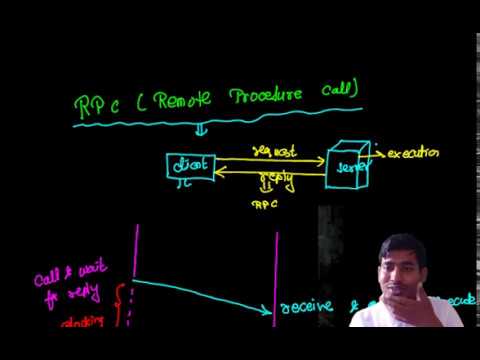Remote Procedure Call-RPC define procedure java rpc-Remote Procedure Call in Distributed System.
Contents
- 0.1 Remote Procedure Call (RPC) in Java & Distributed Systems
- 0.2 1. How Does RPC Work?
- 0.3 2. RPC in Java – Implementing Java RMI (Remote Method Invocation)
- 0.4 Step-by-Step Java RMI Example
- 0.5 3. Advantages of RPC in Distributed Systems
- 0.6 4. Alternatives to RPC
- 0.7 Conclusion
- 1 What is Remote Procedure Call (RPC)?
- 2 Key Concepts of RPC:
- 3 RPC in Distributed Systems
- 4 Java RPC – How it Works
- 5 RPC vs REST vs gRPC
- 6 Summary
- 7 Need More?
Remote Procedure Call (RPC) in Java & Distributed Systems
What is Remote Procedure Call (RPC)?
Remote Procedure Call (RPC) is a protocol that allows a program to execute a procedure (function) on a remote server as if it were a local function call. It is widely used in distributed systems for communication between different machines over a network.
1. How Does RPC Work?
RPC follows these steps:
Client makes a request to invoke a function on a remote server.
The request is converted into a network message and sent.
The server receives the request and executes the function.
The result is sent back to the client over the network.
The client receives the result and continues execution.
Key Components of RPC:
Client & Server: The client calls the remote function, and the server executes it.
Stub: Acts as an interface between the local and remote procedure calls.
Marshalling & Unmarshalling: Converts data into a format suitable for transmission.
Transport Protocol: RPC can use TCP, UDP, or HTTP for communication.
2. RPC in Java – Implementing Java RMI (Remote Method Invocation)
In Java, RPC is implemented using Java RMI (Remote Method Invocation). Java RMI allows an object to call methods of a remote object running on another JVM.
Step-by-Step Java RMI Example
Step 1: Define a Remote Interface
Step 2: Implement the Remote Interface
Step 3: Create and Start the RMI Server
Step 4: Create an RMI Client
3. Advantages of RPC in Distributed Systems
Simplicity: Makes remote method calls look like local function calls.
Platform Independence: Works across different operating systems.
Abstraction: Hides the complexity of network communication.
Flexibility: Supports different transport protocols (TCP, HTTP, etc.).
4. Alternatives to RPC
gRPC (Google RPC): Uses Protocol Buffers (protobuf) for efficient communication.
REST APIs: HTTP-based communication for distributed services.
SOAP (Simple Object Access Protocol): XML-based messaging protocol.
Conclusion
Remote Procedure Call (RPC) allows seamless communication in distributed systems by enabling a client to execute methods on a remote server. Java RMI (Remote Method Invocation) is one of the simplest implementations of RPC. Modern alternatives like gRPC and REST APIs provide more advanced and scalable solutions.
Would you like a detailed guide on gRPC in Java?
Here is a clear and beginner-friendly explanation of Remote Procedure Call (RPC), with a specific focus on Java RPC and its role in Distributed Systems.
Remote Procedure Call (RPC) is a protocol that allows a program to call a function (procedure) on another machine (remote server) as if it were calling a local function.
“A function on one computer calls a function on another computer over the network, and it works like a regular local function.”
| Concept | Description |
|---|---|
| Client | Sends the function call to the server |
| Server | Executes the requested function |
| Stub | A small piece of code that handles network details |
| Marshalling | Converts arguments/data into byte format |
| Unmarshalling | Converts response bytes back to usable data |
In distributed systems:
-
Components of an application are distributed across different nodes (machines).
-
RPC helps in communication between nodes by allowing them to invoke each other’s services.
-
Microservices calling each other
-
Cloud APIs
-
Database service requests
Java has various ways to implement RPC-like behavior, such as:
1. Java RMI (Remote Method Invocation):
-
Built-in RPC mechanism in Java
-
Allows calling methods on remote Java objects
2. Modern Alternatives to RPC in Java:
| Technology | Description |
|---|---|
| gRPC (by Google) | High-performance, open-source RPC framework |
| Spring REST | Using HTTP to simulate RPC calls |
| Apache Thrift | Language-agnostic RPC framework |
| Feature | RPC | REST | gRPC |
|---|---|---|---|
| Protocol | TCP | HTTP | HTTP/2 |
| Format | Binary or custom | JSON | Protocol Buffers |
| Performance | Fast (less overhead) | Slower (text-based) | Very fast |
| Use Case | Internal services | Web APIs | Microservices |
-
RPC = call a function on another machine as if it’s local.
-
Java supports RPC via RMI, gRPC, Apache Thrift, etc.
-
In Distributed Systems, RPC helps decouple components while enabling communication.
Would you like:
-
A Java gRPC example?
-
A YouTube video script explaining RPC with animations?
-
A PDF handout with code and diagrams?
Let me know, and I’ll prepare it for you step-by-step!

